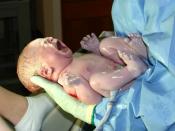"Major Characteristics of Development"
Infancy
Physical - Physical development obviously starts long before the common "infantile" stage that we all think of today. Brain development begins in the weeks following conception. A noticeable brain is apparent after only three to four weeks, when the neural plate folds up to form the neural tube. The bottom of the tube becomes the spinal cord. "Lumps" then emerge at the top of the tube and form the forebrain, midbrain, and hindbrain. The so-called primitive or lower portions of the brain develop earliest, and regulate such biological functions as digestion, respiration, and elimination; they also control sleep-wake states and permit simple motor reactions. All of the above traits of the brain are what makes life possible. By three months after conception, the midbrain and hindbrain are well on their way to being developed, but the forebrain still has a long way to go. Gradually these two hemispheres become larger and more convoluted, making for a characteristically human brain.
Many processes are involved in early brain development, but I won't go into much detail as they are not true parts of infancy physical development. These processes include 1proliferation of brain cells, where neurons are produced at a staggering rate during the prenatal period, 2migration, when neurons migrate from their place of origin to places where they will become part of specialized functioning units, and finally 3organization, which is a complex process involving differentiation of neurons, synapse formation, and competition among and pruning of neurons. The brain weighs about 25% of its adult total at birth, and by age 2, it reaches 75%. Lateralization is one important feature of brain organization, which causes the two hemispheres of the cerebral cortex to become asymmetrical.
Aside from brain development, other tremendous amounts of growth and development occur during...



Developmental Psychology (physical, cognitive, and psychosocial
Great points! This is a very well thought out essay. Good grammar, and thought processes. Well done overall.
2 out of 2 people found this comment useful.